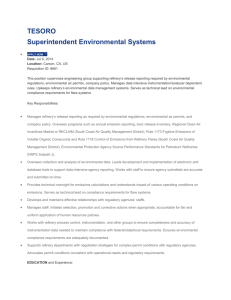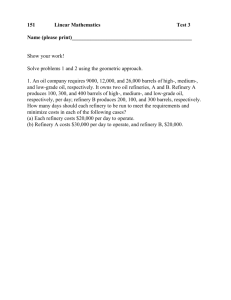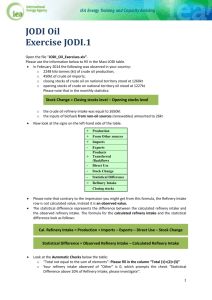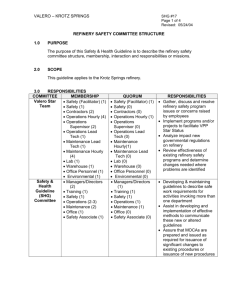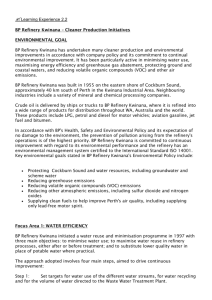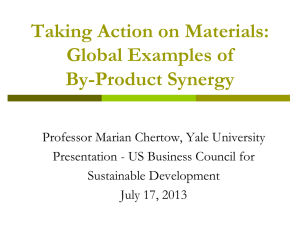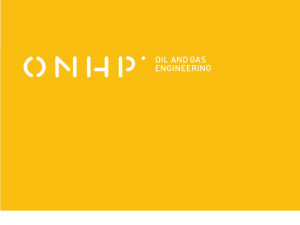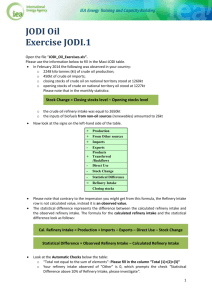History of the Oil Refinery in Rijeka 1882
advertisement
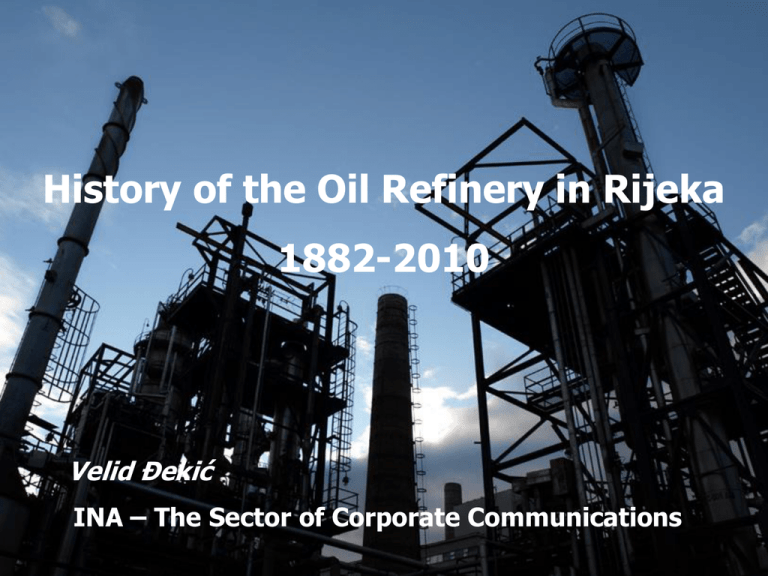
History of the Oil Refinery in Rijeka 1882-2010 Velid Đekić INA – The Sector of Corporate Communications In Budapest, on October 7, 1882, Hungary’s general credit bank founded Mineral oil refinery joint-stock corporation The biggest stockholder of Hungarian general credit bank (and the Mineral oil refinery corp.) was the Rothschild banking family from Wienna Oil on canvas: baron Salomon von Rothschild The Statute of join-stock Corporation: “the priority is the building of the refinery in Rijeka” On Nowember 18, 1882, the lot of land was purchased in Rijeka suburban area of Ponsal (today Mlaka) That area was the west industrial zone of the city (Torpedo factory, Gas factory, Shipyard Lazarus, steam mill, sunflowers oil factory…) The refinery’s installations were built in the summer of 1883 by carrying out a facility design, prepared by Mate Glavan (building of Petroleum port began on December 1882) xxxxxxxx Milutin Barač, professional chemist, Refinery’s builder and the first director, put the Refinery into operation september 13, 1883 The beginning of the modern Croatian and Hungarian petroleum industry Technical director of five refinerys of the joint-stock Corporation, nowadays on the teritory of five different European countries With processing capacity of 60 thousand tons per year, Rijeka Refinery became the largest on the European continent, and the first European facility for the industrial conversion of crude oil Two agitators for refining principal product, lighting petroleum. Other products: parafin (from 1884), lube oils (1887), gasoline, hidryr, wax, bitumen, gas oil, coke, phosphates… The petroleum port in front of the Refinery was able to accommodative five large sailing wessels (first years with Pennsilvanian black gold, transported in barrels and boxes) Refinery’s ship Etelka arrived in petroleum port on 12 December 1892, carrying 3500 tons of oil from Caspian region, as the first and the only Austro-Hungarian tanker The emperor Francis Joseph I visited the Refinery 1891. After him coming the archduke Francis Ferdinand, archduke Franz Salvator and princess Ann, princess from Toscana, count Czecheny, count Wickenburg, bey Saadi… Rijeka in the 1920’s become the nucleus of Italy’s oil production program, embryo of the state-owned oil company Agip The Refinery support market expansion in 1925 by creating shipping company Spem, whit its tankers Prometeo, Lucifero, Tritone, Poseidone and others After technological facelifting, Rijeka’s refining capacity grow to 120 000 tons per year Italoil was the first Italian motor oil brand, started to produced in Rijeka 1926 The Refinery 1939 got a monumental head office in the building designed in state inspired art Novecento style (when head office was inaugurated, Refinery visited dictator Mussolini) Transformed into ruins: in five bombardments by British-American air forces at the end of the World War II, some 260 bombs were droped on the Refinery (weights between 250 and 500 kilos), and Wehrmacht activated 23 land mines) The first postwar motor oil was put on the market in 1952 The king of Yugoslavia’s oil market: in the beginning of the 1960’s, a 100 percent of all lubricants in the country were made in Rijeka, 75 percent of all bitumen, 95 percent of all waxes The Rijeka Refinery, with Sisak Refinery and the Naftaplin (company for production of naphta and gas) formed in 1964 INA, Croatian oil company Thanks to the financial and professional forces of the old refinery on Mlaka, outside of the city were put into operation new, Urinj facilitiy on November 26, 1965 Urinj and Mlaka divide their tasks: the new facilities is specialised in producing fuels, old facilities produces lubricants Intensive development: at the end of 1970’s, capacity grow to eight million tons (1979 processed a record-setting 5,580 million tons) Rijeka Refinery was the producer of the first unleaded gasoline in Yugoslavia, 1984 The government of the Republic Croatia decided to privatize the state-owned company of INA 2003, and Hungarian company MOL become one of the owner of INA (today 47,15 percent) Urinj has started to realisation of a new development cycle, the first phase will be finish until the end 2010 Innercity position of the old location: in the late summer 2008 Mlaka facility stopped production, except blending of motor oils The Refinery as landmark of industrial heritage: first smoke-stack (left, 1883) and the “jounger” smoke-stack (right, 1907) Refinery’s products on the Industrial Exibition in Rijeka with big paraffin column (left, 1899), and Paraffin factory on Mlaka (right, 1884) The candle or paraffin production on Mlaka dated from 1750’s Petroleum port on Mlaka (1884), one of the oldest of its kind on the world: black gold from sailing wessel to modern tankers Thanks to the first location, Rijeka Refinery is today third oldest active refinery on the European continent, and fourth in the world
